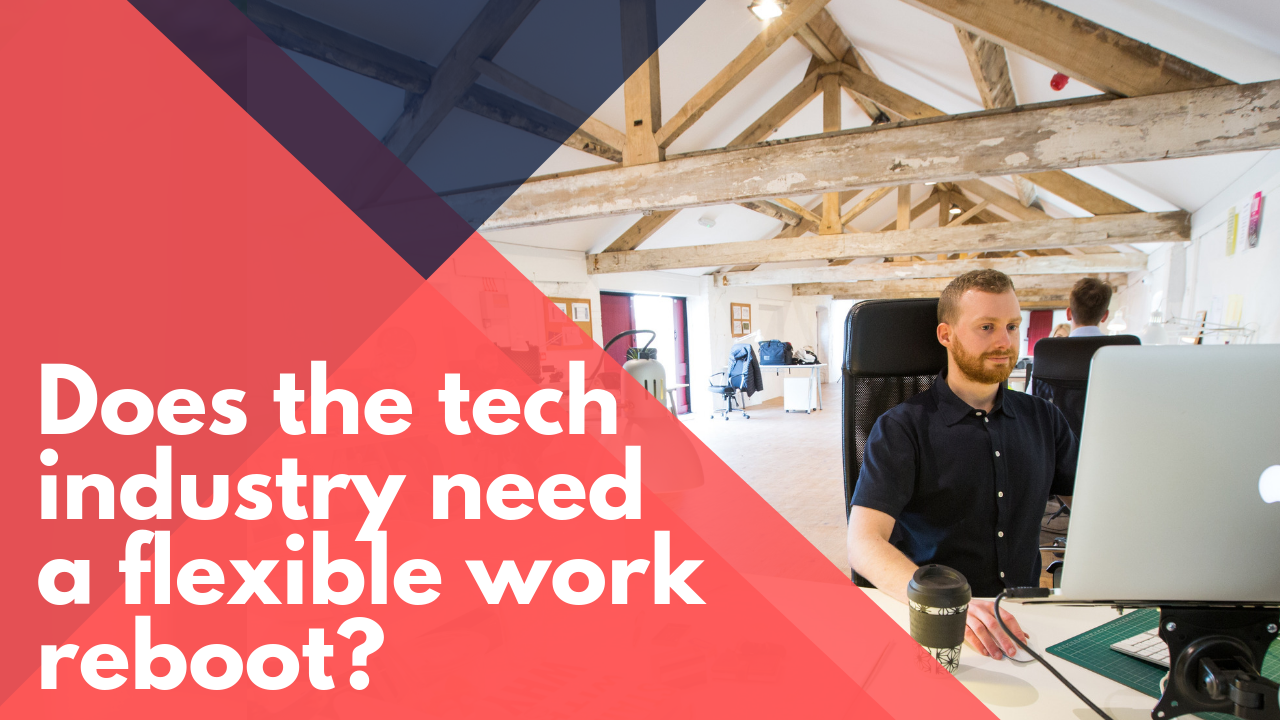- Tech companies are often regarded as flexible work proponents.
- But, 87% such schemes do not see consistent support for flexibility from management.
- If tech companies want to attract a more diverse workforce, they need to offer more flexible working options.
I once worked as a software developer in the Silicon Fen. I assumed that the technical prowess of the companies I worked for meant flexible working options would be, well, an option. I was wrong.
Requests to work hours beyond the standard 9-5, work from home or reduced hours were met with bemusement and grumblings that ‘everyone will just start wanting to do the same’.
Thankfully, much has changed in recent times. A survey by the Smarter Working Initiative reveals that 84% of employees in the tech sector now have the option of flexible working, compared to the UK average of 65%. The anecdotal evidence is also forthcoming. Tech companies like Automattic (the people behind WordPress) let staff choose where they work, for example. LinkedIn and Netflix even reportedly give staff unlimited vacations.
A vast range of flexible working practices now exists for companies to choose from. Software analytics company Werk defines six broad categories, which bring flexibility to a worker’s schedule, location and hours.
But the scale and diversity of flexible work practices bring challenges for the tech industry. A recent report from Werk reveals: “The vast majority of tech companies offer some form of flexibility. However, few have been able to harness its true value due to lack of structure and formal policies.”
In the UK, the Wellcome Trust charity recently retracted plans to move all staff to a four-day working week. It reportedly claimed the process would be “too operationally complex to implement”. The plans were scrapped shortly after a trial revealed four-day working weeks could lower stress and increase productivity for staff.
But the Wellcome Trust is not alone as the disorder surrounding flexible work continues to mount. According to The Tech Industry Benchmark Report, less than 30% of tech companies document their flexibility policies, 87% do not see consistent support for flexibility from management and only 17% actively market their flexible practices (despite flexibility being one of the top search criteria in the war for talent).
Of those tech companies that do have formal flexibility policies, “they tend to underdeliver and rarely meet the needs of their employees.” As a result, tech companies may feel the consequences when it comes to attracting and acquiring the best talent, retaining and engaging with current staff members and promoting diversity and inclusion, according to the report.
Lack of diversity
Tech employees do not have equal access to flexibility with women, non-caregivers and non-white employees less likely to have access to the flexibility they need. “Diversity and inclusion is a top priority for all tech companies, yet data shows that these efforts are being hindered by flexibility inequity issues,” the report form Werk states.
Looking specifically at women in tech, a lack of flexible working opportunities is often regarded as a core reason for the lack of female representation in senior tech roles. The case of former Facebook data scientist Eliza Khuner is a clear example of how poor work flexibility is a fatal blow to many women wanting to climb the corporate ladder. In fact, despite just less than half of women starting a career in tech, only 22% are C-Suite level executives.
This lack of equal access to flexibility is a worrying finding, potentially further exacerbating the continued lack of diversity in the technology sector. (And before naysayers start to pipe up, bear in mind that a lack of diversity in tech doesn’t just adversely affect a company’s bottom line, it’s dangerous too.)
So, tech companies are faced with a challenge. If they really want to attract a more diverse workforce, they need to offer more flexible working options – and these options need to be supported and readily available across the board.
How can this be achieved?
The report from Werk recommends companies analyse their current flexibility and identify those work practices most in demand with their existing employees. Once identified, these best flexible work practices must be structured and communicated across the business.
This is no mean feat but the world’s tech companies are in the prime position to lead in the flexible work arena. From Google’s rich benefits package to agile working practices, technology companies have long been at the forefront of the changing world of work.
Now, the world of tech is a growing and highly competitive industry with both the skills gap and the means to make flexible working a level playing field, showing other industries how it’s done while also addressing its own diversity issues.
A culture of change
But businesses must bear in mind the stigma still associated with flexible work. A separate report found 21% of tech industry employees would rather not broach the subject of flexible working with their managers.
When I worked in tech, there was one beam of light in my pursuit for flexible working options: a considerate manager. He let me come into work early so I could make the afternoon school run, encouraged my professional development and let me shift my working hours if needed to meet the countless demands of working and raising a young family.
However, just as the report from Werk highlights, these flexible work options were available to me on an informal and ad hoc basis. I was lucky, but others were not and such inequality stinks (whether that’s in your workforce or your flexible work policies).
For any flexible work scheme to work does not come down to the technology a company uses or the policies it has in place. Just as I discovered all those years ago, the culture of many tech businesses first needs to change to meet the needs of the workforce. Because flexible working isn’t a technology problem or an issue exclusive to the tech industry, it’s a human challenge.



 Dr. Gleb Tsipursky – The Office Whisperer
Dr. Gleb Tsipursky – The Office Whisperer Nirit Cohen – WorkFutures
Nirit Cohen – WorkFutures Angela Howard – Culture Expert
Angela Howard – Culture Expert Drew Jones – Design & Innovation
Drew Jones – Design & Innovation Jonathan Price – CRE & Flex Expert
Jonathan Price – CRE & Flex Expert













